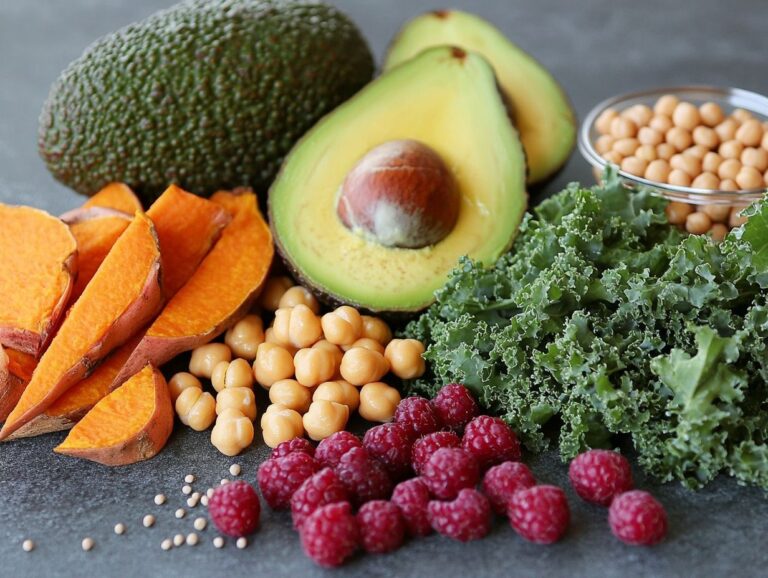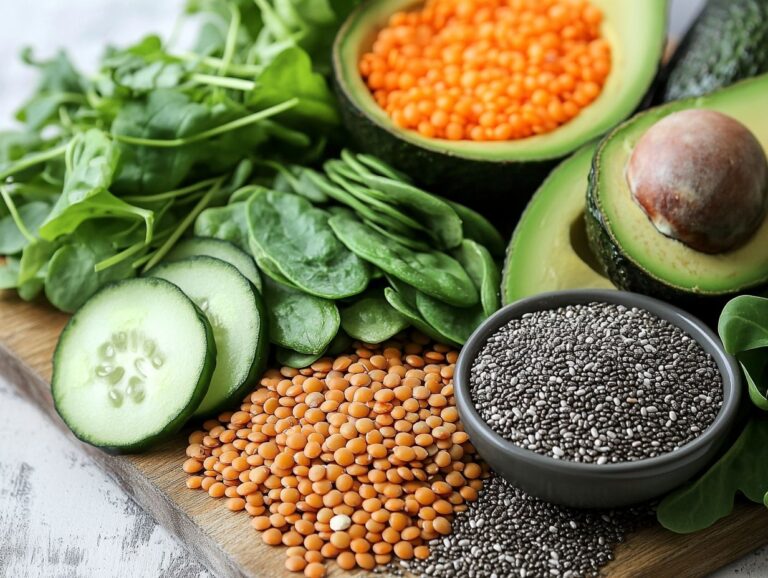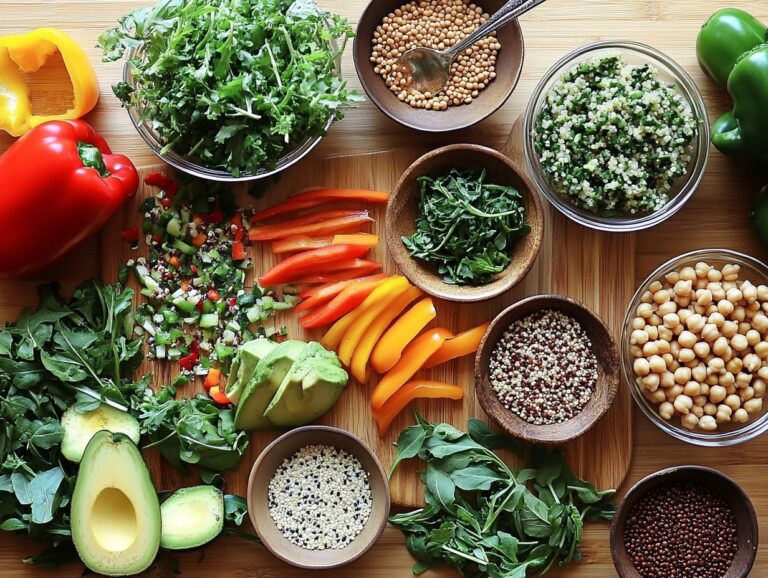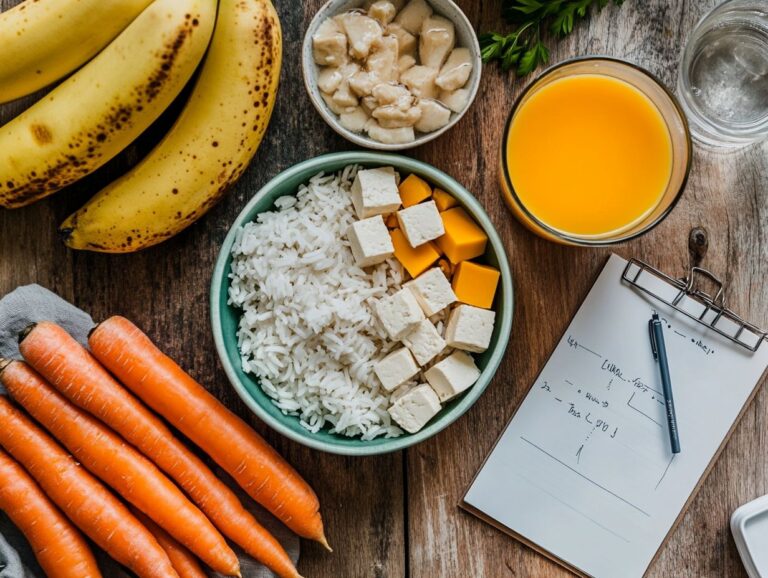The Vegan Slow Carb Diet combines the principles of plant-based eating with a focus on low-glycemic foods to promote steady weight loss and improved health. This diet eliminates animal products and processed foods, emphasizing whole, nutritious options that help maintain stable blood sugar levels. This guide outlines how the Vegan Slow Carb Diet works, its essential rules, the foods to eat and avoid, and the numerous benefits associated with this dietary approach. Whether your goal is to lose weight or increase your energy, this eating plan offers many valuable principles.
Key Takeaways:
- Switching to a vegan slow carb diet can lead to steady weight loss without sacrificing nutrition or flavor.
- By eliminating animal products, processed foods, and white carbs, the vegan slow carb diet promotes healthier eating habits and improved digestion.
- Following the rules of the vegan slow carb diet and incorporating a variety of whole plant-based foods can lead to numerous health benefits, including increased energy and lowered risk of chronic diseases.
What Is the Vegan Slow Carb Diet?
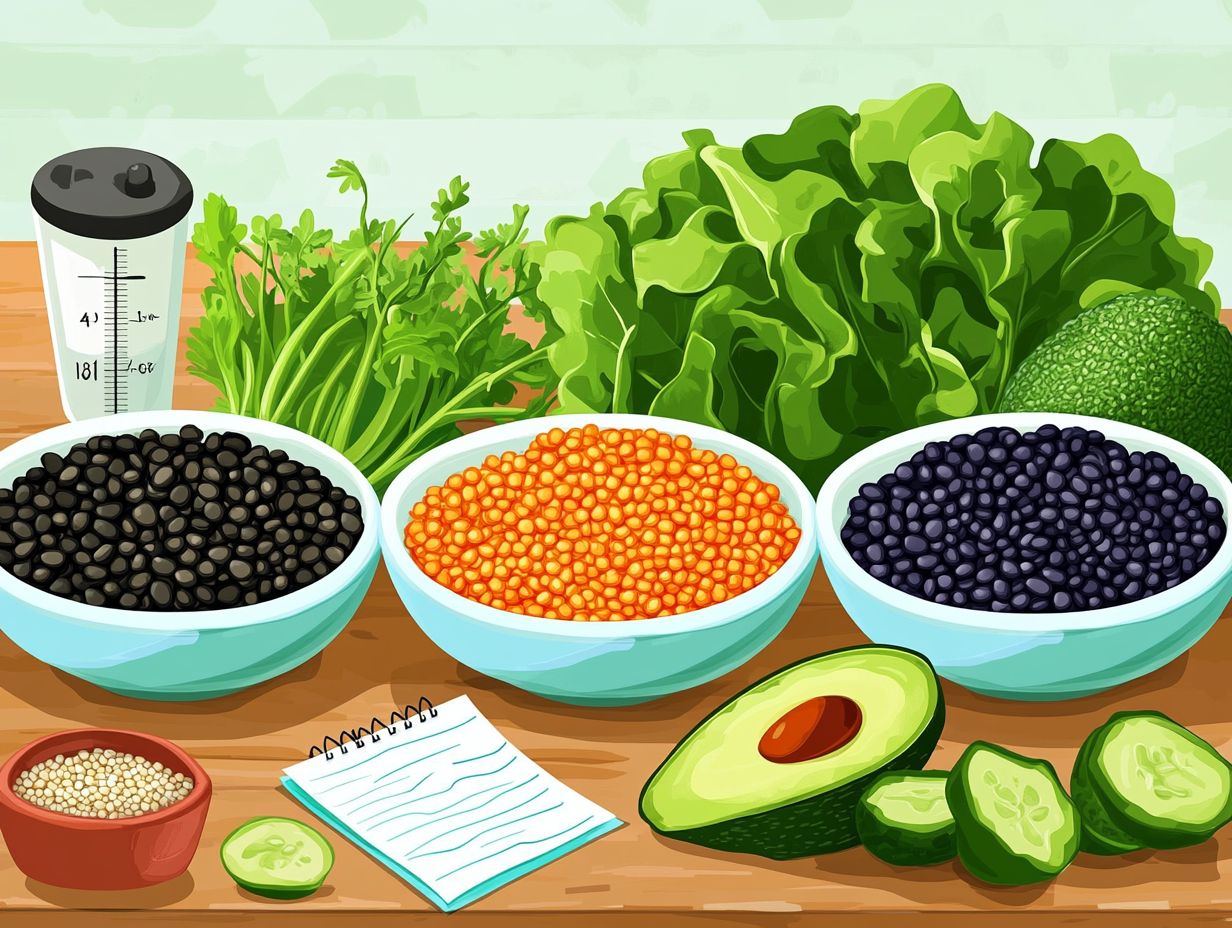
The Vegan Slow Carb Diet is a plant-based dietary approach that emphasizes the consumption of whole foods, as highlighted by dietitian Alexandra Caspero Lenz and plant-based chef Christa Brown, while eliminating animal products, processed foods, and white carbohydrates.
This diet is designed to support individual health goals, such as weight loss and improved energy levels. Developed with insights from renowned dietitians and plant-based chefs, it highlights the importance of essential nutrients and complex carbohydrates. In particular, the diet emphasizes the role of complex carbs in maintaining stable energy levels and achieving desired health outcomes.
As a result, individuals can achieve their desired wellness outcomes while enjoying a diverse array of delicious vegan meals.
How Does the Vegan Slow Carb Diet Work?
The Vegan Slow Carb Diet employs a structured framework that assists individuals in tracking their daily macronutrient totals while emphasizing meal preparation strategies that simplify cooking and enhance nutritional intake.
By utilizing a nutritional database, followers can discover suitable foods that align with their dietary restrictions and health goals, such as recipes featured in popular platforms like EatingWell and Delish Knowledge.
Additionally, the diet fosters a sense of community through shared user feedback and experiences, promoting a community aspect where individuals can discuss their progress and share recipes from sources like “The Plant-Based Baby + Toddler” and “Fresh Italian Cooking for the New Generation.”
What Are the Rules of the Vegan Slow Carb Diet?
The rules of the Vegan Slow Carb Diet include the elimination of animal products, processed foods, and white carbohydrates, all aimed at supporting the diet’s health goals while ensuring a balanced intake of nutrients.
Completely avoiding animal products guarantees a fully plant-based diet. Additionally, steering clear of processed foods and white carbohydrates ensures that the diet consists of whole foods such as legumes, vegetables, and healthy fats, while also preventing the empty calories that could hinder weight loss progress. The use of whole grains, like those available from Trader Joe’s, supports this dietary approach.
1. No Animal Products
The Vegan Slow Carb Diet offers numerous health benefits by eliminating animal products from meals. This diet prohibits all animal products, including meat, dairy, eggs, fish, and seafood, motivated by ethical and environmental considerations as well as the belief that health goals are best achieved through a plant-based nutrition approach that emphasizes whole, nutrient-dense foods.
This dietary shift results in multiple positive health outcomes, particularly through increased dietary fiber and the consumption of nutrient-rich foods that are often lacking in conventional diets. Incorporating legumes, whole grains, fruits, and vegetables can significantly enhance digestion and nutrient absorption.
Additionally, a plant-based diet can aid in weight loss by reducing caloric intake while boosting energy levels, making it easier to stay active throughout the day.
As the body adjusts to this new regimen, many individuals report improvements in mood and energy levels, underscoring the overall benefits of removing animal products from their diet.
2. No Processed Foods
The Vegan Slow Carb Diet prohibits the consumption of processed foods, which often contain unhealthy additives, sugars, and empty calories that can hinder health and weight loss goals. Instead, it encourages the intake of whole foods in their natural state. By avoiding these harmful products, individuals may find it easier to manage their weight, as natural foods tend to be more satiating and lower in calorie density.
Whole foods that are high in fiber are beneficial for the digestive system, promoting regularity and reducing bloating. This dietary approach increases the intake of essential nutrients, allowing the body to access vitamins and minerals necessary for optimal health.
Along with aiding weight loss, this method of eating fosters a lifestyle change that enhances overall well-being in the long term.
3. No White Carbs
A critical principle of the Vegan Slow Carb Diet is the prohibition of white carbohydrates, which refer to processed foods like bread, pasta, and rice that have been stripped of their nutrients and can lead to unstable blood sugar levels. Instead, the diet encourages alternatives such as spicy weight-loss cabbage soup and avocados with tomatoes, which are nutrient-rich and support stable energy levels.
Instead, the diet encourages the consumption of complex carbohydrates found in whole foods and legumes, which provide sustained energy throughout the day.
This approach not only helps maintain energy levels but also promotes better digestive health by supplying essential fiber. Nutrient-dense options, such as whole grains like quinoa and brown rice, as well as legumes like lentils and chickpeas, can be included in the diet.
Complex carbohydrates take longer to break down, helping to prevent blood sugar spikes and improve appetite control. Furthermore, incorporating a wide variety of fruits and vegetables, particularly dark leafy greens and sweet potatoes, enhances nutritional diversity and makes meals more enjoyable. Popular products like Vega Sport and 22 Days Nutrition can also be integrated into this dietary plan to support athletic performance and overall health.
What Foods Can You Eat on the Vegan Slow Carb Diet?
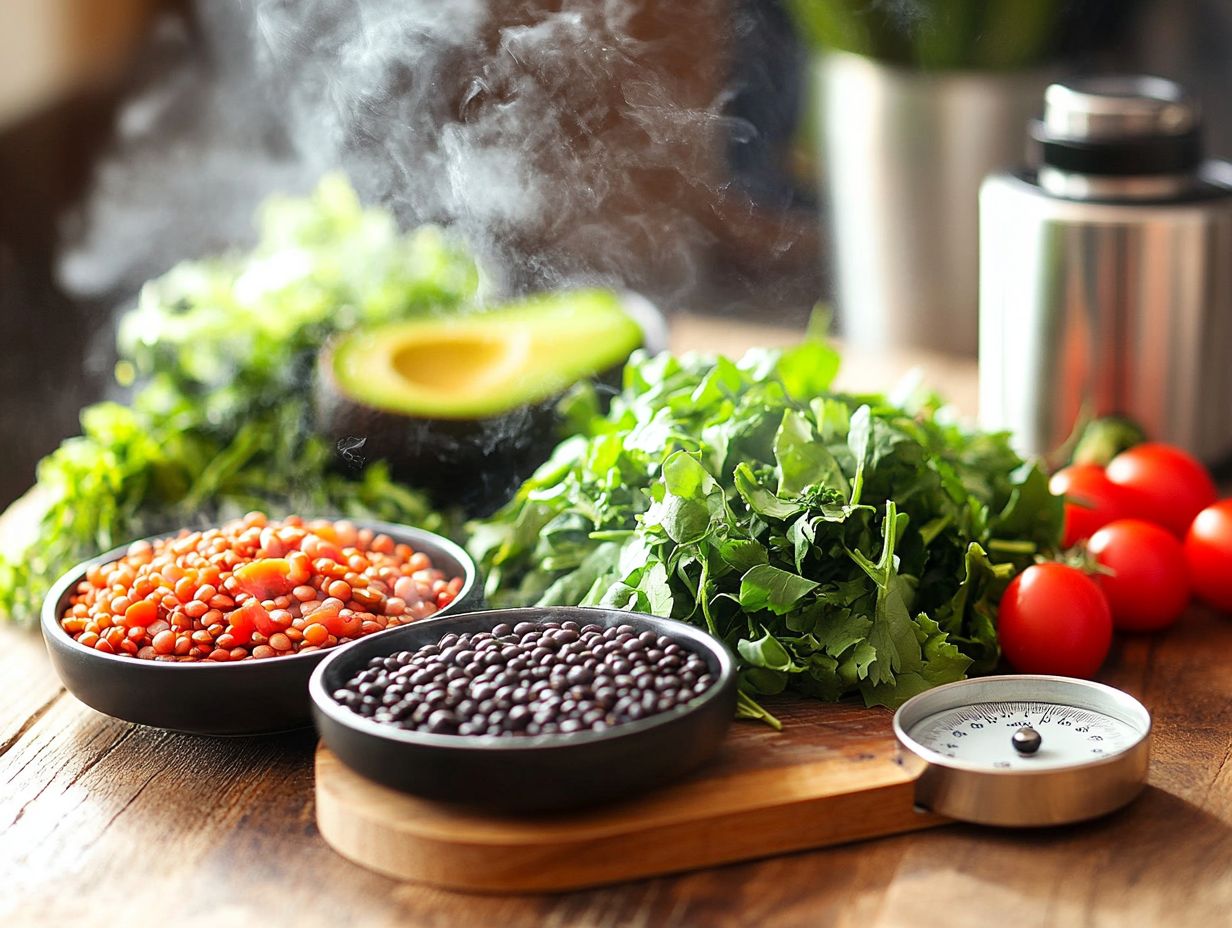
On the Vegan Slow Carb Diet, individuals can enjoy a diverse selection of healthy and nutritious foods. This includes whole foods such as:
- Vegetables
- Legumes
- Nuts
- Seeds
- Fruits
- Whole grains
All of which promote optimal health and support the achievement of various health goals, aligning with the principles found in The Slow-Carb Diet by Tim Ferriss and popular chains like Chipotle offering vegan meal options.
1. Vegetables
Vegetables are fundamental components of the Vegan Slow Carb Diet, as they offer essential nutrients, fiber, and antioxidants that contribute to overall health while boasting low caloric density, making them ideal for meal preparation.
Notable vegetables in this diet include leafy greens such as spinach, kale, and arugula. These leafy greens are rich in iron and calcium, promoting bone strength and energy levels. Additionally, they are low-calorie, high-fiber foods that are excellent sources of various vitamins and minerals, ranging from vitamins A to K, as well as folic acid and magnesium.
Incorporating these greens into meals can help ensure proper hydration and enhance the diet’s overall health benefits.
Cruciferous vegetables like broccoli and cauliflower also play a significant role in this diet, known for their anti-inflammatory properties. They are particularly delicious when roasted or steamed and can be easily added to salads.
Brightly colored bell peppers and sweet potatoes, along with other vibrant vegetables, not only make meals visually appealing but also provide vital vitamins and minerals.
Proper meal preparation of these vegetables is crucial to ensure a balanced diet that meets its basic nutritional requirements. For instance, dishes such as salads, stir-fries, or soups that highlight these vegetables can create a diverse array of meals while maintaining a focus on caloric density.
2. Legumes
Legumes, such as beans, lentils, and chickpeas, are highly recommended on the Vegan Slow Carb Diet due to their high protein content and complex carbohydrates, which enhance satiety and provide sustained energy throughout the day.
These nutrient-dense foods are also rich in vitamins, minerals, and dietary fiber, all of which are essential for digestive health. With a wide variety of flavors and textures, legumes can be incorporated into numerous meal types.
They are most commonly prepared by boiling, pressure cooking, or roasting, adding depth of flavor to salads, soups, and stews. For instance, using legumes in a smoothie freezer technique can provide a nutritious and convenient meal prep solution.
Including legumes in daily diets not only supports weight loss but also promotes a feeling of fullness, making them an essential food group in the Vegan Slow Carb Diet.
3. Nuts and Seeds
Nuts and seeds are essential components of the Vegan Slow Carb Diet, offering healthy fats, protein, and vital micronutrients that promote overall well-being and aid in weight loss when consumed in moderation. These ingredients are often recommended by experts like Ricardo A and featured in popular publications such as the Daily Mail and Amazon’s best-sellers list.
These nutrient-dense foods, such as almonds, walnuts, chia seeds, and flaxseeds, are rich in antioxidants and fiber, which support heart health and enhance digestive function. They can be incorporated into various meals throughout the day to add flavor and texture while providing essential vitamins and minerals.
For example:
- Chia seeds can be sprinkled on smoothies.
- Walnuts can be added to leafy green salads.
- A mix of nuts and seeds can serve as a satisfying snack.
Additionally, nut butters can be blended into oatmeal or used as dips, increasing the healthy fat and protein content of otherwise less nutritious meals, thus encouraging a diverse and balanced diet.
4. Fruits
Fruits play a vital role in the Vegan Slow Carb Diet, providing natural sugars along with essential vitamins and minerals that support health goals while serving as refreshing and satisfying components of meal plans.
Variety is crucial when it comes to fruits, as different types offer unique antioxidant and nutrient profiles, similar to the approach detailed in Maria Rider’s health guides.
For instance, berries are high in fiber and have low glycemic indices, making them excellent for maintaining stable energy levels. Citrus fruits are rich in vitamin C, which enhances the immune system, while melons provide hydration, are low in calories, and make for great snacks. Avocados tomatoes are also excellent choices for energy-boosting meals.
Berries and citrus fruits can be blended into smoothies, added to salads, or transformed into sauces to accompany main dishes. Melons can be enjoyed on their own or incorporated into a fruit salad. Try adding edamame aleppo for a spicy weight-loss snack option.
5. Whole Grains
Whole grains such as quinoa, brown rice, and oats are essential components of the Vegan Slow Carb Diet due to their complex carbohydrates, fiber, and diverse array of essential nutrients that promote optimal health.
These nutrient-dense foods help individuals feel full and energetic throughout the day while reducing the risk of chronic diseases and aiding in the management of blood glucose levels. Additionally, the dietary fiber they provide is crucial for maintaining digestive health. Incorporating beans like black beans can enhance your intake of complex carbs.
Unlike refined grains, which have been stripped of their beneficial bran and germ, whole grains remain unprocessed, preserving their natural properties and offering a wide range of vitamins, minerals, and antioxidants.
To incorporate whole grains into daily meals, one can consider the following suggestions:
- Replace white rice with brown rice.
- Add oats to smoothies and baked goods.
- Create hearty salads using bulgur or farro.
What Foods Should You Avoid on the Vegan Slow Carb Diet?
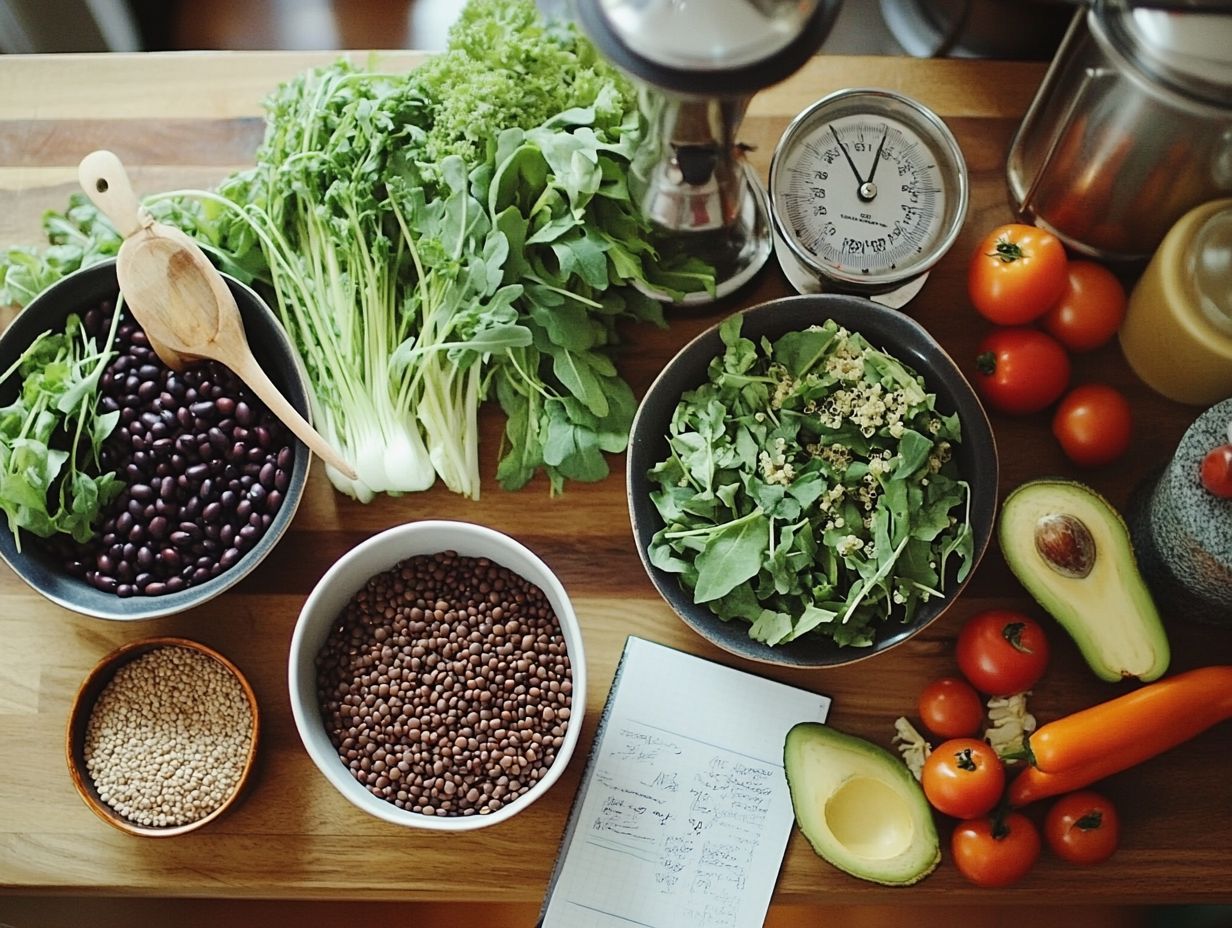
The Vegan Slow Carb Diet advises individuals to avoid specific food categories that may hinder their progress in reaching their health goals.
This includes all types of meat, dairy products, processed foods, and refined carbohydrate products, which are typically low in essential nutrients and high in calories.
1. Meat and Dairy Products
Meat and dairy products are strictly excluded from a vegan diet, as they are not plant-based and can hinder weight loss and health goals by contributing excessive calories.
Diets high in animal products have been linked to an increased risk of heart disease, diabetes, and certain cancers, which is one of the primary reasons many individuals seek healthier plant-based alternatives.
Ethical concerns also play a significant role in the exclusion of meat and dairy from a vegan diet, as the production of these products often involves animal suffering and environmental degradation.
Transitioning to a plant-based diet allows individuals to improve their health while contributing to a more sustainable society.
There are many alternatives to dairy and meat available, such as:
- legumes
- nuts
- seeds
- fortified plant-based milks like those from brands like Vega Sport and 22 Days Nutrition
These can provide similar protein and essential nutrients without the negative aspects associated with animal products.
2. Processed Foods
Processed foods, which often contain harmful additives, sugars, and preservatives, are not permitted on the Vegan Slow Carb Diet because they can disrupt healthy eating patterns and contribute to undesired weight gain.
These products can alter the body’s natural hunger cues and lead to increased cravings and emotional eating, making it challenging for individuals to adhere to their dietary goals. The artificial ingredients found in these foods may cause inflammation and metabolic issues, complicating the pursuit of a balanced lifestyle.
Additionally, their high-calorie and low-nutrient content can create a cycle of fatigue and nutritional deficiencies that undermine the long-term success of any health-oriented diet.
By focusing on unprocessed, whole foods, individuals can enhance their overall wellness and maintain adequate energy throughout the entire dietary journey. Consider a vegan meal from community-focused brands like Trader Joes and Chipotle that offer fresh, plant-based ingredients.
3. Refined Carbohydrates
Refined carbohydrates, such as white bread, pastries, and sugary snacks, are not recommended on the Vegan Slow Carb Diet due to their low nutrient density and high glycemic index, both of which can impede weight loss and negatively affect overall health.
These foods often lead to rapid spikes and subsequent crashes in blood sugar levels, contributing to cravings and binge eating that complicate weight loss efforts.
Instead of consuming refined carbohydrates, it is better to opt for whole grains like quinoa or brown rice, which are rich sources of essential nutrients and provide stable energy.
Additionally, incorporating legumes, fruits, and vegetables adds fiber and micronutrients, promoting feelings of fullness and enhancing overall health. Consider including shirataki noodles for a low-carb vegan option in your meals.
What Are the Benefits of the Vegan Slow Carb Diet?
The Vegan Slow Carb Diet offers several benefits, including steady weight loss, improved digestion, and a reduced risk of chronic diseases. These outcomes are often supported by insights from experts like dietitian Alexandra Caspero Lenz, known for her work on Delish Knowledge and books such as Fresh Italian Cooking for the New Generation.
This diet is an excellent option for individuals seeking to enhance their overall health without making drastic lifestyle changes or sacrificing satisfaction.
1. Steady Weight Loss
The Vegan Slow Carb Diet offers several benefits, including steady weight loss achieved through a focus on whole foods and complex carbohydrates that provide long-lasting satiety and energy. This approach allows individuals to reach their health goals without adhering to stricter eating regimens.
By prioritizing nutrient-dense options, the diet ensures the intake of essential vitamins and minerals that are often lacking in processed diets. For instance, incorporating legumes, whole grains, and a variety of vegetables supports metabolic functions and promotes a sense of fullness, which can help reduce unnecessary snacking.
Additionally, meal timing plays a crucial role; regular eating windows can help regulate blood sugar levels, decreasing cravings and stabilizing energy throughout the day. Many users report significant success, noting that the elimination of processed foods has transformed their relationship with food and enabled them to develop healthier habits that contribute to weight loss and overall wellness. User feedback from platforms like Amazon and Daily Mail often highlight the efficacy of this approach.
2. Improved Digestion
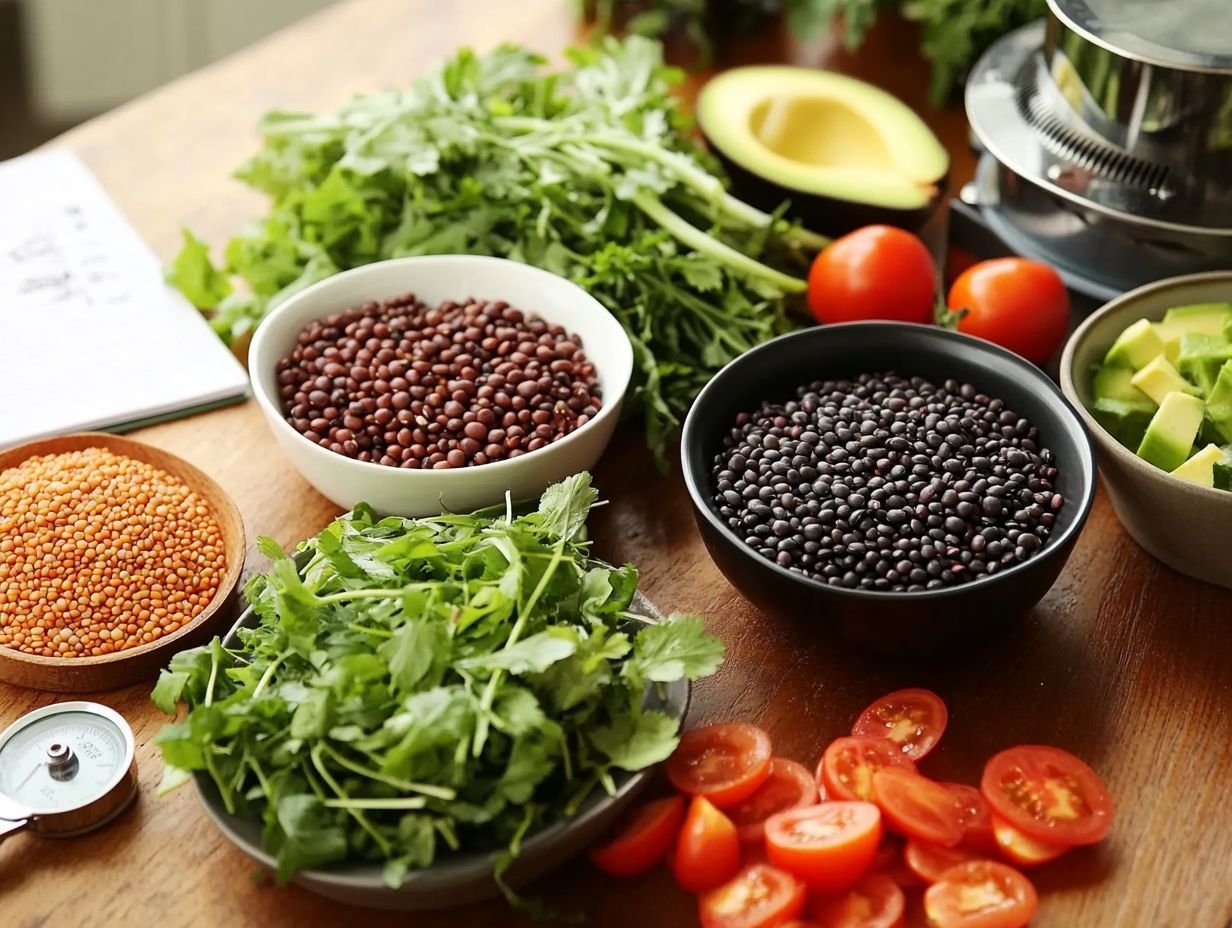
Improved digestion is one of the benefits of the Vegan Slow Carb Diet, which emphasizes whole foods and plant-based nutrition. This diet promotes better digestion primarily due to the high fiber content found in legumes, vegetables, and whole grains, all of which support gut health and regularity.
By focusing on these foods, the diet not only encourages regular bowel movements but also fosters a diverse gut microbiome, which is essential for optimal digestive health. Fiber serves as a prebiotic, nourishing beneficial bacteria in the intestines and promoting their growth and activity. Additionally, the inclusion of foods rich in magnesium and antioxidants further enhances overall digestive function. Plant-based chef Christa Brown offers recipes in The Plant-Based Baby + Toddler that can make this dietary transition easier.
To maintain digestive comfort while following this diet, individuals are encouraged to gradually increase their fiber intake, stay well-hydrated, and incorporate a variety of food sources. This approach can help minimize bloating and discomfort, ensuring a smoother transition to this nutritional lifestyle.
3. Increased Energy
The Vegan Slow Carb Diet is effective in boosting energy levels. By focusing on complex carbohydrates derived from whole foods, this diet ensures a steady release of energy throughout the day, minimizing the energy dips commonly experienced with diets high in refined sugars.
Recommended foods in the Vegan Slow Carb Diet include legumes, whole grains, and vegetables, all of which provide essential nutrients and promote the gradual absorption of sugars. Consuming complex carbohydrates helps maintain normal blood sugar levels, which is crucial for sustained energy.
To incorporate energy-boosting foods into the Vegan Slow Carb Diet, individuals should start by creating a meal plan that includes energy-rich options such as:
- quinoa
- lentils
- leafy greens
Additionally, including nuts or seeds as snacks can help elevate energy levels between meals. Consider referring to nutritional databases for daily totals and meal prep ideas to ensure a balanced intake.
4. Reduced Risk of Chronic Diseases
The Vegan Slow Carb Diet is linked to a lower risk of chronic diseases, such as heart disease, diabetes, and obesity, due to its emphasis on whole, nutrient-dense foods that promote optimal health and longevity.
Research generally indicates a connection between plant-based eating patterns and improved health outcomes. For instance, a study published in The Journal of Clinical Nutrition found that individuals following a plant-based diet had lower blood pressure, cholesterol levels, and body mass index compared to those who consumed more animal products. Influential figures like Tim Ferriss, author of The Slow-Carb Diet, also highlight the importance of whole grains and legumes in their dietary advice.
Experts emphasize that legumes, vegetables, and whole grains—rich in fiber—play a crucial role in reducing the risk of obesity and type 2 diabetes. By prioritizing foods high in antioxidants and phytonutrients, the Vegan Slow Carb Diet not only nourishes the body but also strengthens its defenses against chronic diseases.
How to Get Started on the Vegan Slow Carb Diet?
The Vegan Slow Carb Diet plan encompasses personalized meal plans, the preparation and storage of foods in advance, the establishment of regular eating patterns, and the tracking of compliance and health progress. This can include engaging in meal prep sessions and using a smoothie freezer to prepare quick, healthy options.
1. Plan Your Meals
Meal planning is crucial in the Vegan Slow Carb Diet as it facilitates the preparation of healthy meals that adhere to nutritional guidelines and ensures that necessary ingredients are readily available. Utilizing resources like EatingWell can provide guidance for crafting balanced meal plans.
By developing good meal planning habits, individuals can explore a variety of recipe ideas that are both nutritious and delicious. Controlling portion sizes in line with personal goals helps prevent overeating while still allowing for a diverse range of flavors. Engaging with a community aspect, such as forums or support groups, can provide user feedback and shared experiences, enhancing the dieting journey.
Additionally, using ingredients in various ways minimizes food waste and keeps meals interesting. Emphasizing seasonal produce, legumes, and whole grains during meal planning is vital for ensuring a varied diet, which is essential for achieving optimal health on the Vegan Slow Carb Diet. Incorporating complex carbs and spicy weight-loss options like cabbage soup can also enhance your weight loss journey.
2. Stock Up on Vegan Slow Carb Foods and Essential Nutrients
To successfully follow the Vegan Slow Carb Diet, you will need legumes, vegetables, and healthy fats, as these are the only foods allowed. Having a wide variety of whole foods available will not only simplify meal preparation but will also ensure you have multiple options that meet the dietary requirements. Don’t forget to include vegan meal staples like edamame aleppo, avocados tomatoes, and shirataki noodles for variety.
Key ingredients that can be incorporated into the Vegan Slow Carb Diet for nutritional variety include: quinoa, brown rice, a range of nuts and seeds, black beans, and egg whites.
- quinoa
- brown rice
- a range of nuts and seeds
When shopping for ingredients, local grocery stores are often the best choice, as they typically offer unique vegan options at lower prices. Stores with fresh produce, such as Trader Joe’s and Chipotle, are excellent venues for stocking up on vegan ingredients. For specialty items, online retailers like Amazon have extensive selections.
You can find seasonal fruits and vegetables at farmers’ markets, which are ideal for sourcing local goods and getting inspired to try new meals. Planning your shopping trips around these two options is the best way to fill your pantry. Don’t forget to include items from The Slow-Carb Diet by Tim Ferriss and various recipes from Alexandra Caspero Lenz and Christa Brown in your meal prep.
3. Stay Consistent and Track Your Progress
Consistency and tracking progress on the Vegan Slow Carb Diet are essential for achieving desired health outcomes, as they allow individuals to assess the effectiveness of the diet and make adjustments based on user feedback and results. Tracking daily totals of food intake and nutrient consumption can provide valuable insights.
To successfully maintain dietary changes, individuals should consider various strategies that enhance accountability. Consulting with a dietitian or plant-based chef can provide professional guidance towards your health goals.
- Journaling is one effective method where individuals record their food intake, feelings, and cravings daily. This practice helps them identify patterns and triggers in their lives. Using resources like EatingWell and nutritional databases can also aid in this process.
- Alternatively, using user-friendly apps to track food intake simplifies the process and provides visual representations of their journeys and goals. Apps like Vega Sport and 22 Days Nutrition can be particularly helpful for this purpose.
Being part of a community with similar objectives significantly boosts motivation. Sharing experiences, celebrating milestones, and receiving encouragement from others on similar paths makes it easier to stay committed to a dietary plan. The community aspect can be enhanced through platforms like Delish Knowledge and books like The Plant-Based Baby + Toddler and Fresh Italian Cooking for the New Generation.

